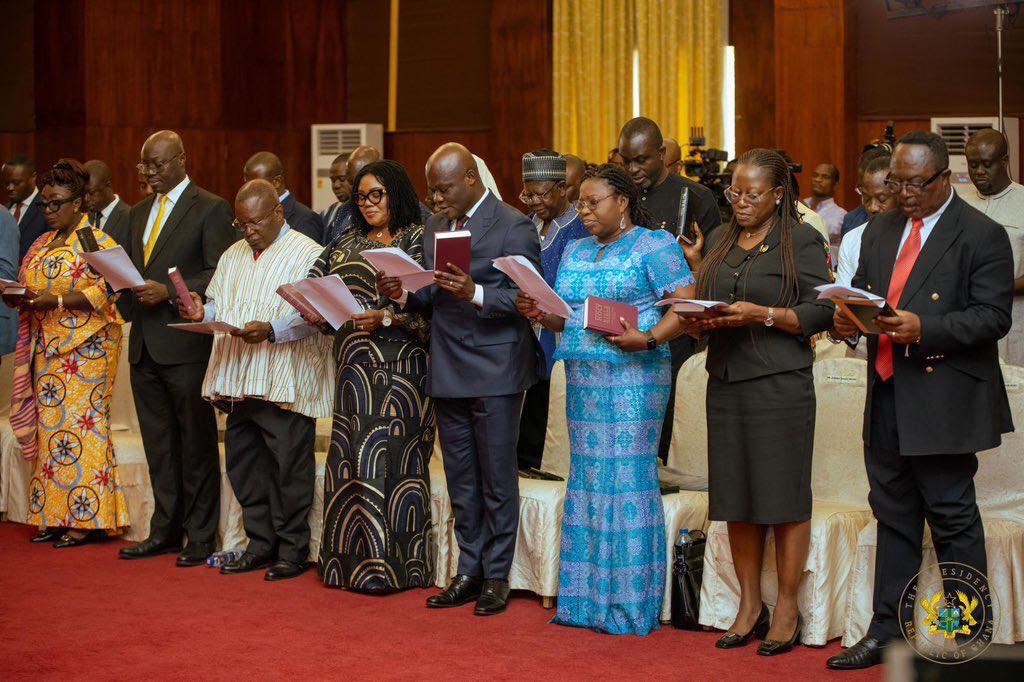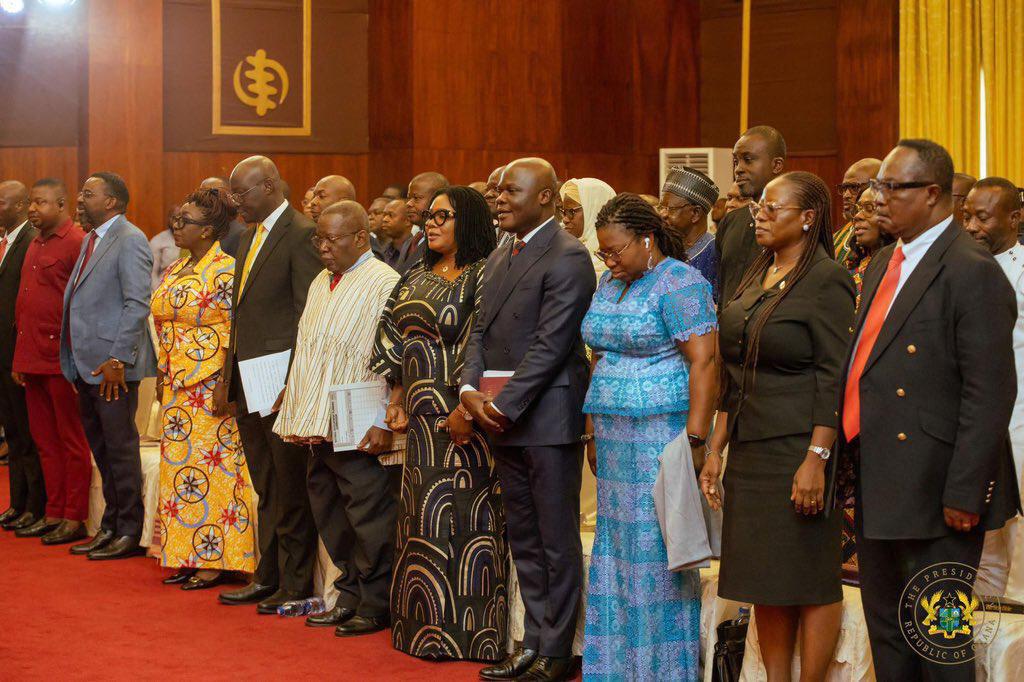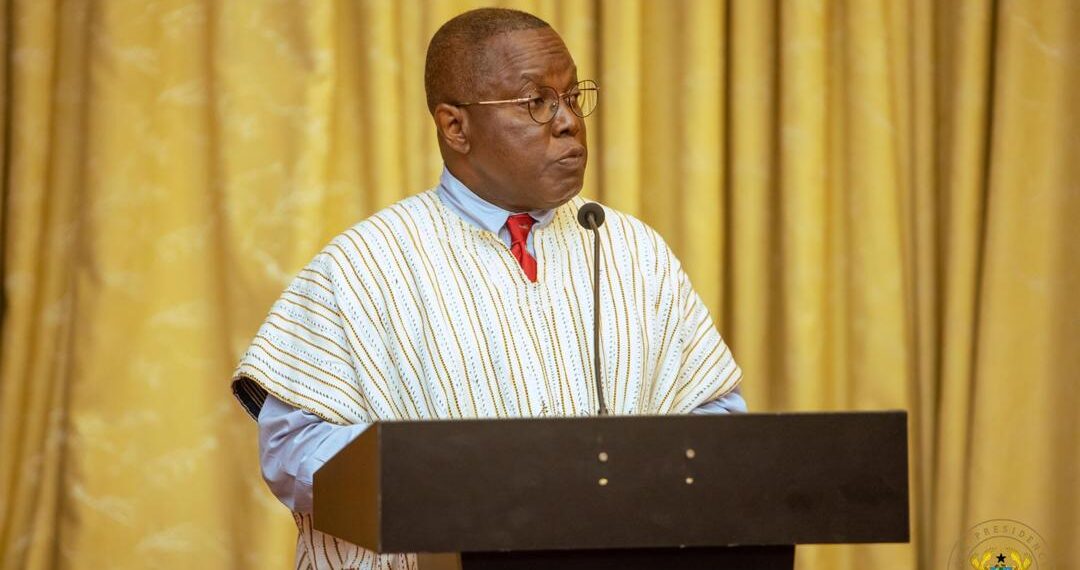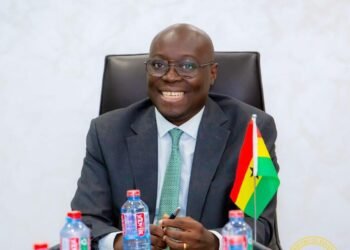At the inauguration of the 8th National Development Planning Commission (NDPC), its Chairman, Dr. Nii Moi Thompson, laid out an ambitious and transformative vision for Ghana’s development agenda, pledging a renewed focus on productivity, decentralisation, civic engagement, and accountability.
Addressing President Mahama, fellow commissioners, and the nation at large, Dr. Thompson reaffirmed the Commission’s commitment to serving as a credible and forward-thinking advisory body while ensuring ordinary Ghanaians have a voice in shaping the country’s development trajectory.
“Mr. President, I would like to thank you for entrusting us with such an important responsibility. And on behalf of all the commissioners, I would like to pledge our commitment to fulfil to the best of our ability the duties and obligations that come with this responsibility”.
Chairman of the National Development Planning Commission, Dr Nii Moi Thompson
Dr. Thompson emphasised the solemn responsibility entrusted to the 37 newly sworn-in commissioners, whose number reflects a reduction from the previous 49, in an apparent effort to enhance efficiency.
He took the opportunity to clarify the structure and work of the Commission for both the media and the general public, stressing its central role in Ghana’s national development planning since its establishment in 1994.

NDPC Eight Core Subcommittees
He outlined the eight core subcommittees of the Commission, which will guide the formulation of long-term, medium-term, and short-term plans.
These include the Economy (focusing on fiscal and monetary policy), Transport and Logistics, Energy and Private Sector Development, Agriculture and Natural Resources, Employment, Productivity and Earnings, Public Sector Reforms and Governance, Social Development, and Infrastructure and Land Use.
This structure, Dr. Thompson noted, is meant to support a holistic, coordinated, and research-driven approach to national development, aligning with the realities and aspirations of citizens.
In a notable gesture, he acknowledged Finance Minister Dr. Cassiel Ato Forson and Bank of Ghana Governor Dr. Johnson Asiama, referring to them as “the two men of the moment.”
He assured the public that the NDPC would collaborate closely with these key economic actors to steer Ghana toward sustainable and inclusive growth.
Dr. Thompson underscored that the Commission is not merely a think tank for government, but a constitutional body with a mandate to create participatory planning frameworks.
“Through the work of the committees and research done by the technical staff the commission is expected to advise you, Mr. President, as it has been doing for successive presidents since 1994.
“But the law also requires the commission to provide a wider platform for Ghanaians from all walks of life including parliamentarians, political parties, faith based organizations, sector ministries, district assemblies, traditional authorities, civil society organizations, think tanks and individuals who have something to say about their country, Ghana among others to contribute to national development planning for the long, medium and short terms.
Chairman of the National Development Planning Commission, Dr Nii Moi Thompson
This wide-ranging consultation, he noted, ensures that national development is not dictated from above but is rooted in the real experiences, needs, and aspirations of Ghanaians across all levels of society.

Transparency and Accountability
Turning to the issue of transparency and government accountability, Dr. Thompson lamented the obscurity surrounding the Annual Progress Reports (APRs), which are critical monitoring and evaluation tools mandated by law.
He pledged to reverse this trend by digitising the reporting process and introducing what he termed “civic auditing”—a bold move to enable the public to monitor the performance of government in real or near real-time.
According to him, empowering citizens with access to such tools is essential for enhancing democratic governance and promoting responsive leadership.
Human-Centred Economic Indicators
Dr. Thompson was particularly emphatic about shifting the focus of economic performance measurement from abstract macroeconomic figures to more tangible and human-centred indicators.
He described the traditional fixation on Gross Domestic Product (GDP) growth as inadequate and alienating to the ordinary Ghanaian.
“What we’ve decided to do for this commission is to have what I call a three-dimensional or three-d approach to measuring economic performance, which means that we measure GDP growth, we measure employment growth, and we measure growth in wages. These are the things that are most relevant to the public, and not just mere statistics”.
Chairman of the National Development Planning Commission, Dr Nii Moi Thompson
This approach, he argued, will better reflect the lived experiences of Ghanaians and enable policymakers to prioritise what truly matters.
Efficiency Vs. Productivity
Quoting President Mahama’s own campaign remarks—“Ghana must function efficiently”—Dr. Thompson explained that productivity must be the anchor of Ghana’s transformation agenda.
He cited stark examples of productivity gaps between Ghanaian and American workers and farmers, noting that while an American farmer produces goods worth over $100,000 annually, the Ghanaian equivalent produces around $3,000.
“The average American worker produces about $80 an hour. This is why they can pay them $10.12 an hour while a typical Ghanaian worker produces about $5 an hour. To close this development gap, this must change, and the commission stands ready to lead in that regard.”
Chairman of the National Development Planning Commission, Dr Nii Moi Thompson
Local Economic Development
Touching on local economic development, Dr. Thompson lauded President Mahama’s known commitment to empowering districts and decentralising governance.
The NDPC, he revealed, intends to revive the long-abandoned District Business Climate Survey—a diagnostic tool designed with technical assistance from Germany—to regularly gauge the economic health of districts across the country.
But this time, he noted, the Commission will seek sustainable funding from the Finance Ministry and the Bank of Ghana to institutionalise the survey beyond donor support.

In addition, the Commission plans to partner with the Ghana Association of Banks, the Bank of Ghana, and other stakeholders to produce, for the first time, detailed disaggregations of business credit, not just by sector as currently done, but also by region and district.
This initiative, he explained, would reveal geographic disparities in credit access and enable government interventions to address systemic imbalances in economic opportunities.
“So that at any given point in time, we know how much credit, business credit, is going to each and every district, and those that then lag behind can be brought to the attention of the government, and the government would take appropriate action.”
Chairman of the National Development Planning Commission, Dr Nii Moi Thompson
Dr. Thompson also used the platform to commend the President’s recent announcement to return responsibility for sanitation management to district assemblies.
He described the long-standing practice of centralised procurement from Accra for goods and services intended for district assemblies as not only inefficient, but also harmful to local autonomy and equity.
He urged the government to deepen such decentralisation reforms, pointing out that local authorities are better placed to manage their affairs, stimulate local economies, and foster inclusive development.
“We need more of such decentralization, the practice of procuring goods and services for district assemblies from Accra does not only undermine the ability of these district assemblies to manage their own affairs but it also constitutes the aggravates inequality and underlines the constitutional aggravates inequality and undermines the constitutional objective of equitable development.”
Chairman of the National Development Planning Commission, Dr Nii Moi Thompson
In closing, Dr. Thompson reaffirmed the NDPC’s readiness to support the President and government in achieving Ghana’s development goals, adding that “We will do everything in our power and within our mandate, Mr. President, to support you to further deepen this major step in decentralisation”.
He emphasised that the Commission’s future work will not only reflect technical rigour but also respond meaningfully to the expectations of the Ghanaian people.
With Dr. Thompson at the helm, the NDPC appears poised to reposition itself as both the conscience and compass of Ghana’s development planning process.
He intends to do so by merging expert knowledge with grassroots insight, performance tracking with public accountability, and visionary planning with pragmatic solutions.
READ ALSO: Fitch Predicts Cedi Will Weaken to GH¢15.50 by Year-End Despite Record Gold Prices




















